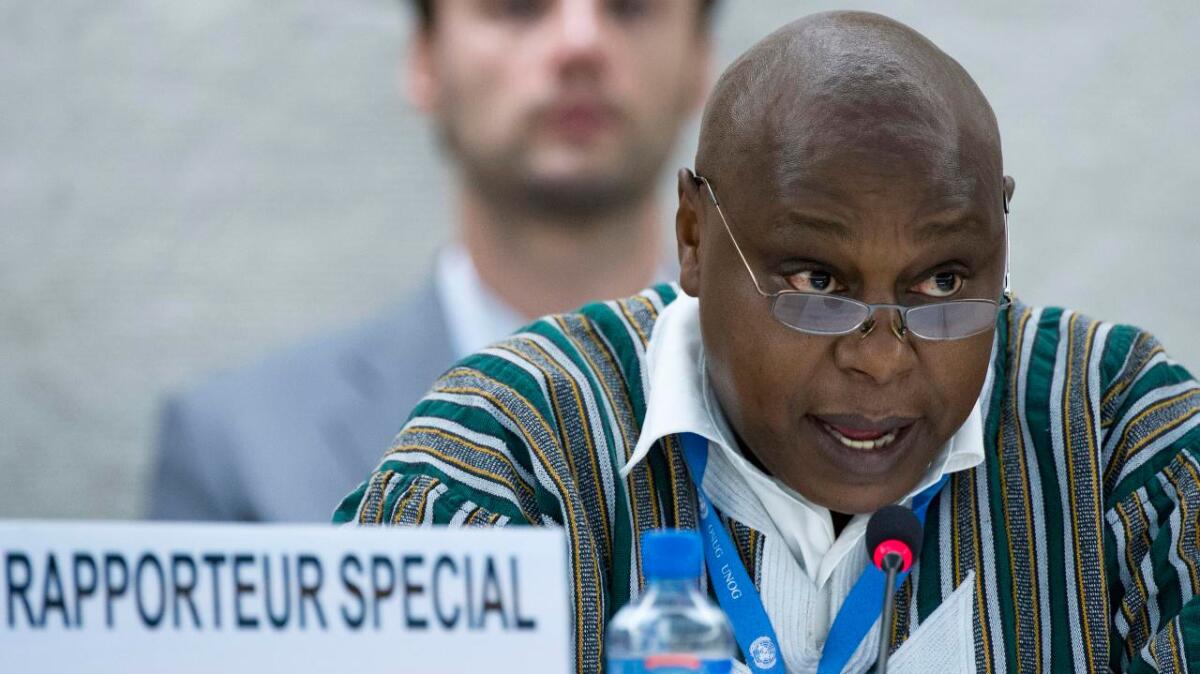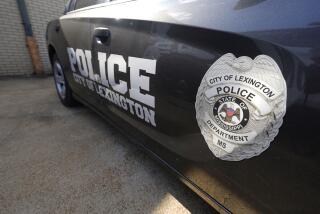‘Blunt discrimination’ by police and ‘crisis levels’ of racism: A senior U.N. official reflects on America

It’s not every day that a senior United Nations official reprimands the U.S. for its race relations, saying the country is “struggling to live up to its ideals” on equality, that “blunt discrimination” by police against black Americans has reached “crisis levels,” and that Congress is “dysfunctional” in how it responds to problems.
But after a 17-day visit that included cities that have become flashpoints in police and race relations, such as Ferguson, Mo.; Baton Rouge, La.; and Baltimore, that’s what Maina Kiai concluded.
A Kenyan human rights lawyer, Kiai is the U.N.’s special rapporteur on the rights to freedom of peaceful assembly and of association, and his trip last month was meant to examine how Americans handle protests.
He had planned his visit with the State Department for months and expected he’d have to search hard for demonstrations when he arrived. Instead, Kiai stepped into a country reeling from back-to-back police shootings of black men and attacks on police in Baton Rouge and Dallas where controversy over race and policing was front and center.
There’s a deep divide in how blacks and whites see race. These numbers prove it. »
Kiai recently released a letter about his travels in which he credited the U.S. for its “resilience” despite difficulties, and wrote at length about workers’ rights, immigration law debates, counter-terrorism, policing and how each relates to 1st Amendment rights.
“The focus of my mission was not race or discrimination,” he said in his statement, a prelude to a fuller report expected next year. “But it is impossible to discuss these rights without issues of racism pervading the discussions.”
He said he saw such issues first-hand during meetings with police departments in New York, Phoenix, Washington, D.C., and Jackson, Miss. At the federal level, Kiai met with officials at the White House — though the schedule did not include President Obama — and the departments of State, Labor, Homeland Security and Justice. He also went to New Orleans and to the sites of the major political conventions — Cleveland and Philadelphia.
People are being approached because they are black, not because they are bad drivers. Police and police chiefs have to start thinking differently.
“People have good reason to be angry and frustrated at the moment. And it is at times like these when robust promotion of assembly and association rights are needed most,” Kiai wrote in his initial report.
“I was pleased to observe that police in the states I visited have a good understanding of the best practices of managing assemblies, and that they have the capacity to implement them, which they often do,” he later added. “But they also sometimes ignore these best practices, preferring intimidatory and discriminative tactics.”
The Times spoke to Kiai, who has been the first special rapporteur — an independent, volunteer expert — on freedom of assembly since 2011, and has made similar visits to Britain, Rwanda, Georgia, Oman, Kazakhstan, Chile and South Korea.
Questions and answers have been edited for length and clarity.
The U.S. doesn’t rank high on lists of countries with human rights issues, unlike some of the others you’ve visited. Why here?
I only go where I am given access. I have tried to go to other countries, like Russia, but they have not allowed me in. Meanwhile, the U.S. made it very easy for me to come. There’s an openness and willingness to improve.
That said, there’s no perfect society. There is no country anywhere that’s got a perfect human rights record. There are always concerns and issues. So we try not to make comparisons. It’s not about who is better. What is important is really talking to people who are living there who feel their rights are being violated. You will get people who say, “Why look as us? We are not the worst in the world.” But we need to look.
What stood out in your travels?
Police who work with the community are incredible, and they are out there. If they don’t, there is trouble, and some have at times become oppositional. If a person takes a community approach to policing, there is much more comfort between police and the community.
Even though there are all these restrictions and rules, generally protests still can happen in the U.S. That’s a good thing.
The other thing that stuck out is the role of the civil rights division of the Department of Justice. It can play a tremendously effective role when it comes in and looks at a police department. The mayor of New Orleans invited the Justice Department in, and it has borne fruit. On the other hand, you have a police force like in Ferguson that had a lot of work to do.
On the civil society side, I have been thoroughly impressed by the doggedness of activists.
Is there a problem with race and policing?
There are serious tensions between police and communities. Partly, it’s about how police operate. One of the most interesting events I attended was in Philadelphia. There was a civil rights activist at a forum; he was white and a lawyer. He said, “I drive badly. I don’t indicate when I’m turning; I speed. But in 40 years I have never been stopped.” Then a black community member talked about how he always gets stopped. That’s one problem with how police are policing. It’s what is getting people angry.
You were in Baton Rouge right after the height of protests over the death of Alton Sterling, whose July 5 shooting by police was caught on video and spurred demonstrations around the country. What was your reaction?
My condolences to the families of police and those killed by police. But there are frustrations. The best way to ease them is to allow as much protest as you can. In Baton Rouge, the protests were peaceful and police let them happen with little interference. Then they began arresting peaceful protesters and bringing out riot gear, and the tone changed. Dialogue between police and protesters needs to be more effective.
How do people in Kenya and elsewhere view race and policing in the U.S.?
The first time we saw the militarized police in Ferguson was a huge shock. I was thinking, my goodness, the U.S. seems to be becoming what you see in Russia. But the other thing one has to say is that even though there are all these restrictions and rules, generally protests still can happen in the U.S. That’s a good thing. Many countries work so hard to prevent protests and hurt protesters, so often people are left with little choice of what to do.
As a special rapporteur, your recommendations could be completely ignored. What’s the point?
We have to accept that the U.N. system is based upon willingness of countries to make changes. But it also comes with moral pressure. It’s a public report and civil society in the U.S. can use it to make its case. Other countries can also look at a report like this and pressure the U.S.
I do really believe the U.S. is interested — at least with the current administration — with becoming better, with having a good international image. You invite in someone like me because you want ideas.
Jaweed Kaleem is The Times’ national race and justice correspondent. Follow him on Twitter, Facebook and Instagram.
ALSO
CIA releases thousands of previously classified briefings to Presidents Nixon and Ford
Nuclear accident in New Mexico ranks among the costliest in U.S. history
Soldier who killed 5 Dallas police officers showed PTSD symptoms, documents show
More to Read
Sign up for Essential California
The most important California stories and recommendations in your inbox every morning.
You may occasionally receive promotional content from the Los Angeles Times.











